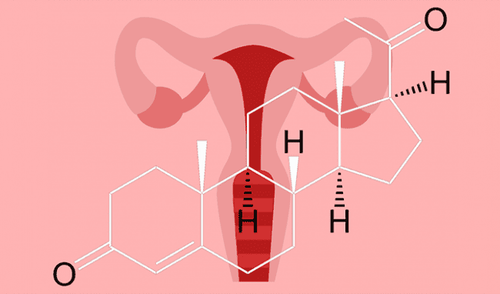This is an automatically translated article.
Progesterone is a female sex hormone produced by the ovaries after ovulation in the menstrual cycle. Progesterone test is a test to measure the amount of Progesterone secreted by the body. The results of measuring Progesterone in your blood can help your doctor know if you are ovulating or if you are having an irregular ovulatory cycle.1. What is Progesterone?
To understand the progesterone test, you first need to know what role progesterone plays in the body as well as on the fetus and pregnant mother. Progesterone is produced in the ovaries shortly after the follicles have released an egg during the menstrual cycle. Progesterone plays an important role in the endocrine regulation of the sex organs as well as the woman's body, the menstrual cycle and affects the development during pregnancy of the fetus. Progesterone plays an important role, especially in ensuring that the uterus is always ready to accept pregnancy. After ovulation, this hormone increases, which will help the lining of the uterus thicken, ready for fertilization of the egg and sperm. If fertilization does not occur, progesterone levels will then gradually decrease until the lining of the uterus sheds and menstruation occurs. Conversely, if an egg is fertilized with a sperm, progesterone levels will increase to maintain this thick endometrial layer, providing nutrition throughout pregnancy. In addition, progesterone is also essential for mammary gland development, milk production along with the female sex hormone estrogen.Not only women just secrete progesterone, men also have a small amount of this hormone, they play an important role in the production of the male sex hormone testosterone, which is a hormone secreted by the adrenal glands.
2. What is a Progesterone Test?
Progesterone test is a quantitative test of the amount of progesterone the body secretes, through determining the amount of this hormone present in the serum. This is one of the blood tests that cannot be performed by any laboratory because a modern machine system is required.
Xét nghiệm progesterone là xét nghiệm nồng độ progesterone cơ thể tiết ra
3. When is a progesterone test needed?
Progesterone tests may be ordered for women who are having problems getting pregnant or have irregular periods. Quantitative results of Progesterone blood levels will help doctors know if there are signs of ovulation, if there are any abnormalities in the menstrual cycle. This test helps diagnose and treat fertility problems.Progesterone levels change throughout a woman's menstrual cycle and throughout pregnancy. People with too low progesterone levels can be caused by poor ovarian function, menopause, and post-menopause.
Progesterone test can be most ordered in pregnant mothers as well as a therapy to help check the health of pregnant women and fetuses.
The test will help doctors find out why you are having trouble getting pregnant, and also help determine if ovulation is present. The test is also used as a substitute for other hormone therapies or to assess the health of pregnant women.
Progesterone test should be ordered if the doctor suspects that a woman has an ectopic pregnancy or is at risk of miscarriage. An ectopic pregnancy is a condition in which a fertilized egg does not attach to the uterus but instead attaches to other sites such as the cervix, fallopian tubes, and the abdomen. Low progesterone levels are also a warning sign of miscarriage early in pregnancy.
4. What to prepare for the progesterone test?
To conduct a quantitative Progesterone serum test, a technician will take a sample of your blood and send it to the laboratory for analysis.Most people needing a test do not have to prepare anything before a blood sample is drawn, however they may require certain preparation steps to be taken. For example, when you are taking birth control pills, progesterone supplements or blood thinners, this can cause inaccurate progesterone levels. In most cases, you will need to stop taking the medicine for a certain period of time before drawing blood.
5. Risks of the progesterone test
As with other blood draw tests, the risks are not a concern for most people.When the needle is inserted into the vein to draw blood, you may feel pain. Or when the blood is drawn, the bleeding continues for several minutes. The place where the needle is inserted to draw blood will have a bruise that will quickly or last a long time.
Serious complications from a blood draw are rare, as you are monitored for a certain period of time after the blood is drawn. These complications include fainting, infection, phlebitis, bleeding disorders...
Tell your doctor if you experience any abnormalities when taking blood for testing and afterwards.

Xét nghiệm progesterone chỉ định cho phụ nữ gặp vấn đề khi mang thai
6. What does the progesterone test result mean?
The test results in serum progesterone levels in ng/mL, your doctor directly receives your results, based on standard results (depending on sex, age, menstrual cycle, possible). are pregnant) that diagnose.If a woman is menstruating, progesterone levels will be low, a few days after ovulation, levels will peak, then go back to low levels, unless you are pregnant.
In general, a progesterone test result is normal if it falls within the following range:
Postmenopausal women, early menstruating, men: Less than or equal to 1 ng/ml. Women between menstrual cycles: 5 - 20 ng/ml. Pregnant women in the first 3 months: 15-60 ng/ml. Pregnant women in the second trimester: 25.6 - 89.4 ng/ml. Pregnant women in the last 3 months: 48.4 – 42.5 ng/ml. The amount of progesterone gradually decreases in preparation for the birth of the baby. In fact, progesterone levels fluctuate a lot, not only with the menstrual cycle but also during the day. So it's up to ̧ of the specific case that your doctor assesses you for potential reproductive health problems.
High progesterone levels outside of pregnancy can be caused by:
Ovarian cancer . Adrenal cancer. Congenital adrenal hyperplasia disorder. Progesterone levels are low due to:
Not ovulating. No menstruation. Miscarriage. Ectopic pregnancy. Thai dead. Currently, Vinmec has deployed the Basic Gynecological Examination and Screening Package. This examination package can detect inflammatory diseases early, making treatment easy and inexpensive. When registering for the Basic Gynecological Examination and Screening Package, customers will receive:
Gynecological examination. Transvaginal ultrasound of the uterus and ovaries. Bilateral breast ultrasound. Tests such as: Treponema pallidum rapid test, Chlamydia rapid test, taking samples for cervical-vaginal cytology, bacterioscopic staining (female vaginal fluid), HPV genotype PCR automated system, total analysis Automated urine collection.
Please dial HOTLINE for more information or register for an appointment HERE. Download MyVinmec app to make appointments faster and to manage your bookings easily.













